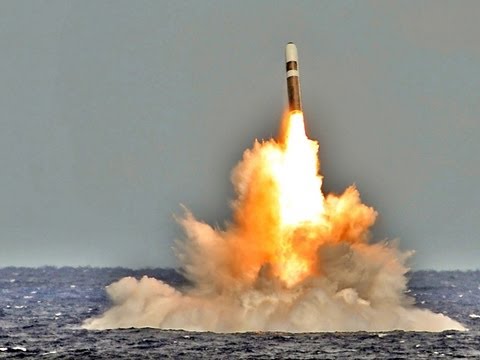Nuclear weapons are generally an important political topic, especially in countries with big nuclear arsenals. Their possession and expense are perceived as a burden by many and as an important aspect of national security by others. Debates rage over maintaining, expanding or reducing nuclear arsenals. Recently, the issue of nuclear weapons programs has roiled politics in the United Kingdom.
In June of last year, there was a test of a British Trident missile off the coast of Florida. The test ended in failure but fortunately, there was no nuclear warhead on the missile. The missile was aimed away from the Florida coast but veered back toward the coast before the missile was destroyed. U.S. defense officials said that the missile changed course because of automatic programming during a self-destruct sequence. The electronics on the missile detected some sort of anomaly and dived into the ocean.
In August of last year, the House of Commons of the U.K. Parliament voted to renew the U.K. Trident program without knowing about the failure of their Trident missile off Florida the previous month. The vote was four hundred and seventy-two to one hundred and seventeen.
Now the Prime Minister and defense officials in the U.K. are in the hot seat on the question of when they knew about the failed test and why they did not inform Parliament before the critical vote to renew the Trident Program. The U.K. Secretary of State has cast doubt on the statements of the U.S. offense official with respect to the significance of the failure of the test but refuses to give any details about the test. Yesterday, the Prime Minister repeatedly refused to admit that she knew about the failed test despite being questioned multiple times in a television interview.
A spokesperson for the Prime Minister said that the previous Prime Minister would, of course, have been made aware of the test and its results back in July. The current Prime Minister would have been briefed on the Trident program in general and the July test in particular when she took office last July after the test. The Prime Minister's office insisted that the reason for the test was certification of the readiness and competence of the crew and, as far as they were concerned, the overall test was successful despite the fact that the missile malfunctioned. Pressed on the failure of the missile during the test, the spokesperson said that their office was not in the practice of giving out operational details on the tests of Trident missiles.
Defense officials claimed that it is not the practice of the U.K. military to give out details on the test of their missile systems. However, the fact that the U.K. military has repeatedly boasted about successful missile tests to the press would seem to be at odds with the claims of the defense officials.
Despite the attempts of the U.K. Prime Minister and the U.K. defense officials to shrug off their failure to inform the public and the Parliament about the unsuccessful Trident missile test last July, it is difficult not to wonder if that failure was not linked to the possible impact such knowledge might have had on the vote to renew funding for the U.K. Trident missile system.
Launch of U.K. Trident Missile:
